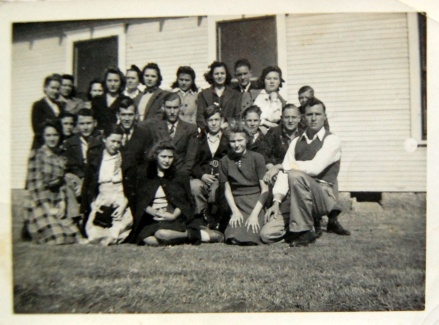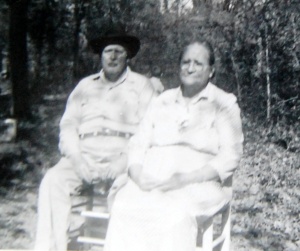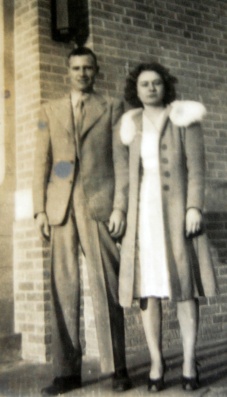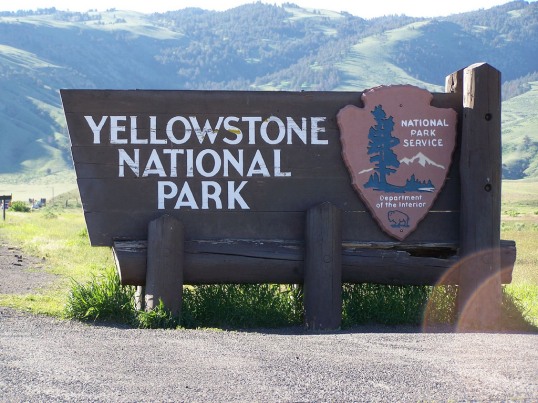Dwight Eisenhower 1952-1960

Me, a snowman and the shotgun house on Fulton.
Dwight Eisenhower, a hero of WWII, was elected in November 1952. He would be re-elected in 1956 and would guide the country through the post war economic boom. It was a golden era in America. We had won the war and we had become the most powerful country on the planet. Life was good.
I started first grade at East Central in the fall of 1952, but I didn’t  finish the year there. Mom and dad bought a house in Dawson at 2001 N. Fulton, on the Corner of Fulton and Ute. It was a shotgun house on a lot that was twenty-five feet wide. There were two plum trees in the small front yard. The streets were dirt. The rooms were lined up, with the living room at the front, the kitchen at the back, and a bedroom in between. We had running water, but no bathroom, just an outhouse at the back of the back yard. Mom and dad paid $2,000 for the house. I finished the year at Bryant Elementary, and would stay there through the sixth grade.
finish the year there. Mom and dad bought a house in Dawson at 2001 N. Fulton, on the Corner of Fulton and Ute. It was a shotgun house on a lot that was twenty-five feet wide. There were two plum trees in the small front yard. The streets were dirt. The rooms were lined up, with the living room at the front, the kitchen at the back, and a bedroom in between. We had running water, but no bathroom, just an outhouse at the back of the back yard. Mom and dad paid $2,000 for the house. I finished the year at Bryant Elementary, and would stay there through the sixth grade.
Right across the street lived my dad’s mom and dad. They had a little one-bedroom house

Side and Lily Mae Pruitt

Leland in back yard at Grandma and Grandpa’s. Chickens in background.
with a nice garden spot, a storm cellar, and they had a pen full of chickens. Sometimes on Sunday, the Pruitt clan would gather at grandpa and grandma’s house, and they’d go catch one of their chickens, butcher it, cook it and serve it for Sunday dinner, as it was called, though we would eat around lunchtime. The gathering would often include Elmer, and dad’s sisters, Lorene, Lula May, Leora and Opal and their families.
Dad made improvements to the shotgun house. He added a bathroom and a bedroom for me. There was a vacant lot north of the house and he put a big garden there. We played horseshoes in the back yard. I learned to ride a bike in that same back yard. For maybe my seventh birthday, mom and dad went to Oklahoma Tire and Supply and bought me an expensive bicycle. It was green with a big tank and it had lights, a horn, and even turn signals. It had cost a huge amount, $75, which mom and dad paid off in monthly payments. The thing was, I didn’t know how to ride a bike. Dad tried to teach me in the back yard, but at first I crashed the big bike repeatedly. I kept getting back on though, but by the time I could ride without wrecking, the new bike had suffered some damage.

Church group. Mom and dad are lower right.
Sometime in the years we lived in the little shotgun house, an old neighbor woman named Pittman befriended my mother and was a regular visitor. She got mom to go to church with her at The Church of God of Prophecy, just a block west of where we lived. Soon dad started going to church too, and so did I. I was too young to realize it at the time, but things changed after mom and dad started going to church. The church had a lot of rules about how you lived life. We stopped going to the movies. I have only a dim memory of watching a movie at the Mars Theatre in Dawson. I didn’t go back to the movies until I was in high school and had my own car.
Because the church taught against wearing any kind of jewelry, mom and dad took off their wedding rings and put them away. Mom and dad stopped playing cards. The church taught modesty in dress, especially for women. All the church women wore dresses that revealed as little skin as possible. Shorts were forbidden, as were low-cut or sleeveless garments. Mom followed the church fashion guidelines.
In retrospect, I suspect mom and dad became church goers because they were still reeling

Pruitt family portrait with our 53 Chevy and shotgun house.
from the loss of their baby girl. It had been a few years, but I think they were still grieving. The church offered the comforting thought that they would someday get to see their baby in heaven. Maybe it helped a little. There were other reasons. The church provided fellowship in a time when interaction with other humans was still very popular. The early 50s were the last, fading years of social activity before television took over everywhere and people started staying home entranced by the tube. The church gave mom and dad a new social circle, and it included fun stuff like pot luck dinners, pie suppers, church picnics, and softball games. At the time, there was also the moral belief that good people went to church. That peer pressure was even stronger for mom and dad because dad’s brother Elmer became a pastor for the Church of God of Prophecy and so did mom’s sister Imogene’s husband Wallace Lane, so we had preachers in the church on both sides of the family.
In those last days before TV became ubiquitous, radio was still a big entertainment medium. We had one of the console radios in the huge wooden cabinets and I would listen to programs like The Lone Ranger, Superman and The Shadow. Some people were buying televisions, but it would be years before we had one, for two reasons. First, our church advised against TV because of the worldly entertainment programs. Secondly, a small black and white model was expensive, several hundred dollars, which was a lot at the time.

New baby in the family, early 1954,
Another momentous event took place for us in 1952, though I didn’t know it at the time. Mom became pregnant for the third time. My parents never told me a baby was coming, so it came as a shock when dad woke me up in the middle of a cold January night to tell me he was taking mom to the hospital. He took me across the street to grandma and grandpa’s house where I spent the night. The next morning one of my older cousins came by and walked with me to school. I had no idea what was going on until my mother came home a few days later with a brown-skinned baby. Leland Ray was born January 12, 1953, and he looked a lot like my dad, with dark hair and brown eyes. Like my mom, I was fair, red-headed and green-eyed. Leland appeared to have gotten the Cherokee genetics that were said to be in our family.
Leland was a good baby and a happy child and I think he brought a measure of joy into  our home that had been missing. He was seven years younger, and that was a gap of years that was hard for us to bridge. He was little, cute and well behaved, and quickly became the darling of the family.
our home that had been missing. He was seven years younger, and that was a gap of years that was hard for us to bridge. He was little, cute and well behaved, and quickly became the darling of the family.
In May 1955 my grandma, Lily Mae Wilkett Pruitt died of breast cancer. I would find out later that dad was holding her in his arms when she died and I think it happened in her little house across the street. I have few memories of Grandma Pruitt. She had the same Cherokee look as my dad and always seemed to be cheerful and smiling. I didn’t attend the funeral and was insulated from the whole thing by mom and dad. But I know it had to be hard for dad who was close to his mother and dedicated to her. Lily Mae was buried at New Hope Cemetery in Spiro.

Leland and me, Easter 1955
When I was in second grade, my teacher was named Mrs. Frazier, and I made my first real school friend that year. His name was Gary Hawkins, and he lived just a few blocks over and we remained best friends through high school. We’d spend most of our time playing games, chess, board games, card games and later we both had Lionel electric trains sets. As we got older we’d play tennis and miniature golf, go swimming at the pool in McClure Park, go to Bell’s Amusement park sometimes, or attend Tulsa Oiler baseball games.
It was during this period of time that I developed a love for reading. There was something called the bookmobile that came to Dawson once a week. It was a big drive home that had been converted by into a small mobile library. It was parked right on my route home from school and I’d always stop and check out the maximum of six books and read all of them before the week was out. I was reading hundreds of books a year and I was soon thinking about how great it would be to be a writer. I wrote to one of my favorite writers, Stephen W. Meader, and he wrote back and sent me a signed cover of one of his books.
In 1957, we moved again, to a two-bedroom rent house at 1936 N. Oxford. I’m not sure

Leland in the back yard of the house on Oxford.
what occasioned the move, and we only lived there about a year. The house was just blocks from my school where I was in the sixth grade. It was the first house we’d ever lived in that was built by a professional home builder and was in a nicer neighborhood of tract houses. From the front yard of the house on Oxford, you could look across Sheridan and see Spartan Manufacturing, the former Spartan Aviation where dad had worked at the start of World War II.
I remember my dad’s brother, uncle Luther coming to visit us at that house. Luther was the only Pruitt sibling who hadn’t settled in Tulsa. He lived in Wichita Falls. He was also the only one of the three brothers who had served in WWII, and had seen action on a tank crew in Europe. He was a heavy drinker and though I was only 12 at the time, I could tell he

The Pruitt brothers, Luther in Army uniform, Elmer, lower left and Claude, lower right.
was drunk that night. Uncle Luther was the bad boy of dad’s family. I remember once before when he’d showed up unexpectedly a few years before at grandma and grandpa’s house driving a car we hadn’t seen before. He pulled the car into the back yard and did a quick paint job with cans of spray paint. Later I came to realize Luther probably repainted the car because he was on the run from something or someone.
Behind my elementary school that year, they were going up with a new junior high school, and the rumor got out that it was going to have a swimming pool. Hamilton Junior High opened in the fall of 1958, but I didn’t go there. In the summer of 1958, we moved back to the house on Apache, out on the lone prairie, and I started junior high that fall at East Central. I didn’t like East Central and complained often to mom and dad. Also I was stuck out in the country miles from town and the fun activities Gary and I had been enjoying stopped.

Dad in 1957
Once again, we were hauling water and going to the outhouse. Dad set out to make improvements. On the lowest part of the property about 200 feet from the house, he hand-dug a well to sixteen feet deep, blasting out the last few feet of limestone with dynamite. Dad hired me and two of my cousins to dig a ditch from the well to the house for 10 cents per foot of ditch dug. Dad put in a bathroom and had a pond dug, but the pond never held water and the well didn’t provide enough water during dry spells. We were living like pioneers, and not very happily. Mom didn’t like living out either and after a year on the prairie, in 1959, we moved back to town, to the shotgun house on Fulton.
I was 13 and I was becoming a problem child. I’d complained loud and long about having to attend seventh grade at East Central, and I’d been strong-headed about it. I was angry about not getting to go to the new school with the swimming pool and I was a malcontent and refused to rid e the school bus. Amazingly, mom and dad put up with my whining and drove several miles to give me a ride to school every day and picked me up after school every day.
I think a lot of my acting out was because I was trying to provoke some kind of response from mom and dad. I have a theory, it’s just a guess, but I think when Patricia died, mom and dad were so devastated, they withdrew into a shell to protect themselves from the pain. I think they also withdrew from me. They still provided the basic necessities like food, shelter, clothing, but they pulled away emotionally and physically and I felt alone and abandoned. I reacted with anger, with demands to try to get them to connect with me. They found it easier to meet my demands than to reconnect. So that was how I grew up, pretty much on my own in my room.
Leland was a different story. He was easygoing, happy, innocent and he didn’t cause trouble He also didn’t come with the baggage of a dead sister. He was a new start, another chance. I think dad was pleased to have a miniature version of himself running around the house.
I was getting harder to parent. I was willful, opinionated and audacious. Some of my bad

Sid and Lily Mae Pruitt
attitude was just genetics. There was major anger streak in the Pruitt line that I inherited. My grandpa Sid Pruitt was an angry, gruff man. I once remarked to one of my cousins that I couldn’t remember having even one conversation with my grandpa Pruitt. Her response was that you didn’t have conversations with him. I could also see the family anger in my dad’s brothers and sisters. Only my dad seemed to have escaped the anger demon, and I think it was because he was a lot like his mother who was a gentle, happy soul. But not me. That old Pruitt anger skipped right past my dad and landed right on me. When, for whatever reason, mom and dad stopped interacting with me, it fueled that anger.
 In the fall of 1959, I started eighth grade at Hamilton Junior High and rejoined my friends and classmates from elementary school. The rumored swimming pool? Did I get to use it? Yes I did, once a week in gym class, but there was something weird about the swim session. We swam nude. No swimsuits allowed. In what still seems to me like a double standard, the girls’ gym classes wore swimsuits. Swimming naked with a bunch of teenage boys was a little awkward, but it was outweighed by the fun of getting to swim. The swimming turned out to be even better than I thought because I became a better and better swimmer because of the regular pool practices, and by the end of ninth grade, I was one the best swimmers in the class.
In the fall of 1959, I started eighth grade at Hamilton Junior High and rejoined my friends and classmates from elementary school. The rumored swimming pool? Did I get to use it? Yes I did, once a week in gym class, but there was something weird about the swim session. We swam nude. No swimsuits allowed. In what still seems to me like a double standard, the girls’ gym classes wore swimsuits. Swimming naked with a bunch of teenage boys was a little awkward, but it was outweighed by the fun of getting to swim. The swimming turned out to be even better than I thought because I became a better and better swimmer because of the regular pool practices, and by the end of ninth grade, I was one the best swimmers in the class.
I was lucky enough to get into a new algebra program that had just started. The new plan allowed students who had some math ability to study first year algebra in the eighth grade and second year algebra in the ninth. Mr. Howard, our algebra teacher, pushed his students, but he was dedicated and he was good at teaching a tough subject. This was an era when students were still paddled in school for misbehavior. I remember Mr. Howard taking this German kid, Immo Gabbe, out in the hall and giving him swats time and again. I felt sorry for Immo. He was the only student from another culture in the whole school, he spoke with a strong German accent and I think it was impossible for him to fit in. I don’t know if he was really behaving badly or Mr. Howard just had it in for him. But in the small fishbowl of junior high, Immo was one of the first hints that there was a bigger world out there.
Hamilton was better than East Central. Besides swimming and algebra, it had elective classes and I learned to type, took a year of Spanish and I was even in the Glee Club for a year, despite the fact that I couldn’t sing. For fun, there was a hayride with my algebra class and I went roller skating on Saturdays at the rink on Pine.
I had a friend named Ricky Garrison. He had a paper route and sometimes when his family went on vacation, I’d substitute for him. After a while, I decided to get a paper route of my own. I think it was the winter of 1959 I got my own route in Dawson. About 1,000 people lived in Dawson, but only about 40 took the Tulsa Tribune, the evening paper. I delivered papers by bike over the rough, potholed streets of Dawson. I made 1.5 cents for every paper I delivered Monday through Saturday, but on Sunday morning, I got up early to deliver the Tulsa World and the big Sunday paper paid 4.5 cents per paper delivered. At least that was what I was supposed to make. Actually, I made almost nothing because I had to collect from my customers and some of them dodged paying me. They just wouldn’t answer the door. I’d eventually cut off their paper, but by then I’d lost money. During the few months I had the route, I never made much money. Finally, one month I lost money and mom and dad had to bail me out and I quit.

 finish the year there. Mom and dad bought a house in Dawson at 2001 N. Fulton, on the Corner of Fulton and Ute.
finish the year there. Mom and dad bought a house in Dawson at 2001 N. Fulton, on the Corner of Fulton and Ute. 




 our home that had been missing. He was seven years younger, and that was a gap of years that was hard for us to bridge. He was little, cute and well behaved, and quickly became the darling of the family.
our home that had been missing. He was seven years younger, and that was a gap of years that was hard for us to bridge. He was little, cute and well behaved, and quickly became the darling of the family. 




 In the fall of 1959, I started eighth grade at Hamilton Junior High and rejoined my friends and classmates from elementary school. The rumored swimming pool?
In the fall of 1959, I started eighth grade at Hamilton Junior High and rejoined my friends and classmates from elementary school. The rumored swimming pool?























